Election 2015: I want to 'see job through', says Cameron
- Published
David Cameron: "We have more people in work than ever in our history"
David Cameron has said he wants to complete the job of "turning the country around" as the election campaign officially got under way.
The prime minister said he would offer the "strong leadership" needed while Labour said it had a "better plan".
Labour leader Ed Miliband said the Tories' EU policy threatened business, but faced questions over corporate backing for his party's position.
Other leaders hit the campaign trail with 38 days to go to polling day.
Following months of unofficial campaigning, the five-and-a-half week race for No 10 - which commentators say could be the most unpredictable election in a generation - began in earnest after Parliament was dissolved.
In other key developments on Monday:
The Conservatives defended a claim that families faced a £3,028 average tax rise under Labour after a leading think tank said the figure was "unhelpful"
Ed Miliband launched Labour's business manifesto amid a row over corporate backing for its EU policy
Deputy Prime Minister and Lib Dem leader Nick Clegg said his party would occupy the "reasoned centre ground" during the campaign
UKIP leader Nigel Farage unveiled his party's five main election pledges
Both Welsh Labour and Welsh Conservatives launched their campaigns
The Green Party of England and Wales said it could be in a "decisive" position if there's a hung parliament while The Green Party of Scotland launched its manifesto, including a pledge of a £10 minimum wage
David Cameron will stand on the far-right next to SNP leader Nicola Sturgeon in Thursday's seven-way leaders' debate after lots were drawn for podium positions
Chancellor George Osborne said details of the Conservatives' planned £12bn welfare cuts would be set out in a spending review after the general election
Issues likely to dominate the campaign in the run-up to 7 May include the economy and spending cuts, Britain's EU membership, the future of the NHS and immigration.

Analysis by political editor Nick Robinson
It's all about you. Not them. You. That's worth remembering if/when you tire of all those politicians, soundbites and photo opportunities that will fill the airwaves - and your inbox - from the formal start of the campaign today, until polling day.
About you because a general election is one of those rare times when your voice counts as much as anyone else's.
About you because you have the chance to help choose who represents you and your community in Parliament.
About you because you can influence who will run the country for the next five years and, therefore, help shape what sort of country you live in.
Rarely has there been a choice so wide or one with an impact which could be so dramatic.

Speaking after holding a 10-minute audience with the Queen at Buckingham Palace, Mr Cameron promised to campaign in "all four corners of all four nations of the UK" during the next 38 days.
The election, he said, was "about moving forward after five years of effort and sacrifice", and he suggested voters faced a "stark choice" between the Conservatives and Labour.
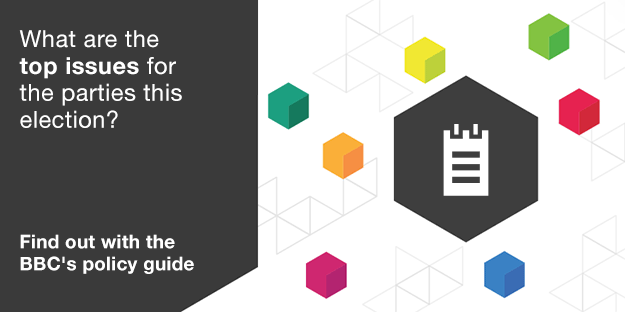
The UK was on the "right track", he insisted and, outlining his campaign themes, he said a Conservative government was needed to guarantee rising employment, lower taxes, greater home ownership, better schools and dignity in retirement.
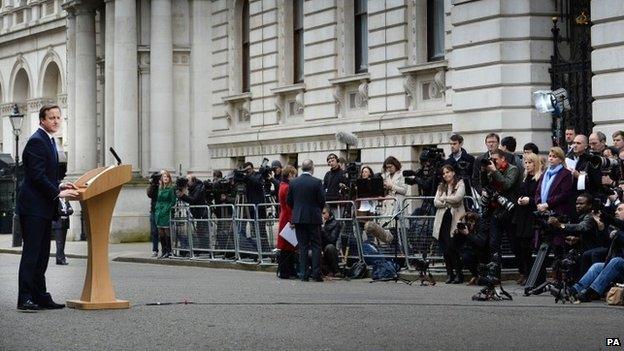
Mr Cameron said he would campaign in all "four corners of the UK"
"Together we are turning our country round and for your sake, for your family's sake, for the sake of your children and their future, we must see this through together."
He added: "This election also takes place when the world is dangerous and uncertain.
"So we need strong leadership to safeguard our national security as well as our economic security."
Full BBC Election 2015 coverage
Mr Miliband said there were "two futures on offer" at the election: "To carry on with a Conservative plan based on the idea that as long as the richest and most powerful succeed, everyone else will be OK.
"Or a Labour plan, a better plan, that says it is only when working people succeed that Britain succeeds."
Labour has said the economic recovery under the coalition has been the slowest in more than 100 years and resulted in a cost-of-living crisis.
It has pledged to raise living standards of "everyday working people", to cut the deficit and secure the future of the NHS.
Speaking on Monday in the City of London, Mr Miliband said the Tories' pledge of an EU referendum in 2017 represented a "clear and present danger" to jobs and prosperity and, in contrast, Labour would "return Britain to a leadership role" in Brussels.
'Right and left'
However, Mr Miliband was forced to defend a full-page advert in the Financial Times warning about the danger of EU exit after a number of business leaders quoted in it expressed concerns about being included.
Juergen Maier, the UK boss of German manufacturer Siemens, said he "stood by" his comments that a referendum would cause uncertainty but said his firm was "apolitical" and did not want to be "very closely aligned to a Vote Labour campaign".
Labour said they were only quoting public statements.
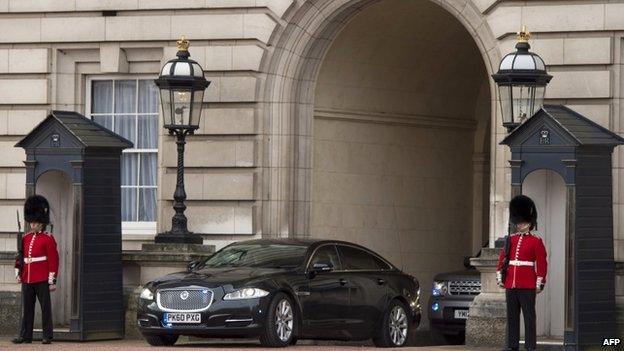
David Cameron and Nick Clegg visited Buckingham Palace in quick succession
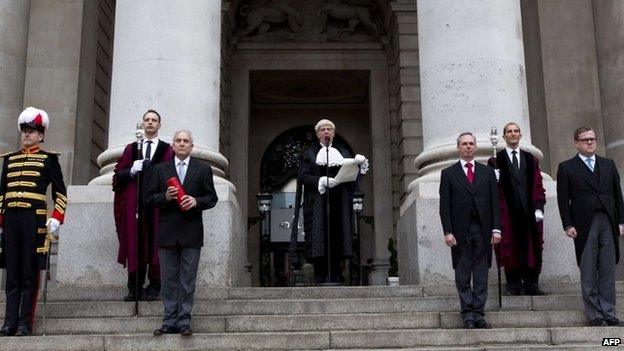
Ceremonies marking Parliament's dissolution took place in London, Edinburgh and Cardiff
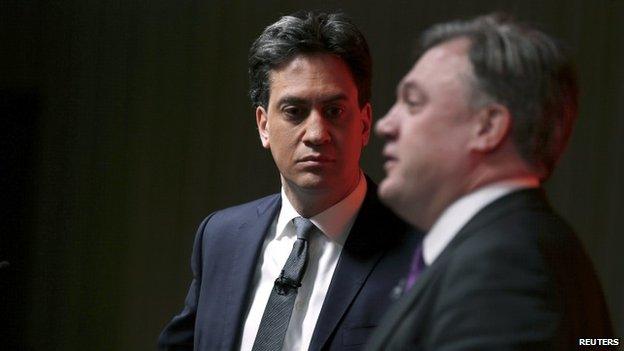
Labour has insisted none of its spending pledges will be funded by more borrowing
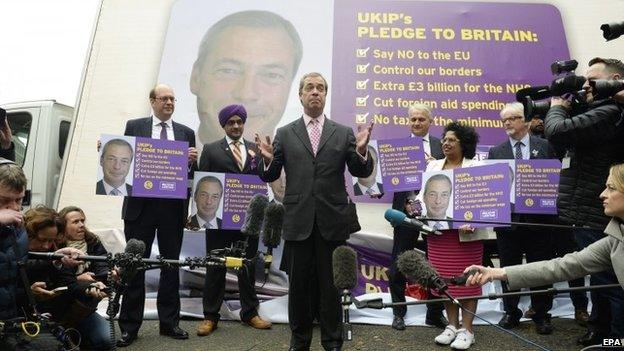
UKIP expects to win a "good number of seats", its leader Nigel Farage said
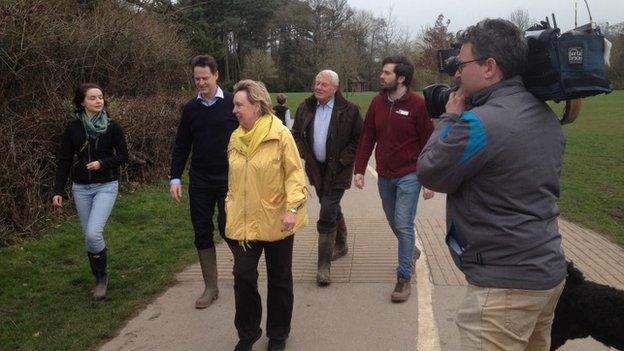
Nick Clegg accused his rivals of "lurching" to the left and right
Mr Clegg, who had a separate audience with the Queen in his capacity as chair of the Privy Council, external, said his party would cut £50bn less than the Conservatives and borrow £70bn less than Labour.
"You see Labour haring off to the left, sticking its head in the sand and not dealing with the deficit," he told the BBC.
"You see the Conservatives chasing after UKIP on the right and indulging in plans for ideological cuts to public services."
Unveiling his party's pledge card, Nigel Farage said UKIP would leave the EU, tighten controls on immigration, slash foreign aid spending, invest £3bn in the NHS and take all those on the minimum wage out of income tax.
Speaking in Westminster, Mr Farage said UKIP was "the most eclectic, diverse political party" in the country and "quite reflective of modern Britain".
Natalie Bennett, leader of the Green Party in England and Wales, said voters were "desperate for change" and promised "a different sort of politics".
All the party leaders have conceded the election is on a "knife edge" with opinion polls suggesting there is little to split the Conservatives and Labour.
After Parliament's dissolution, MPs cease to be members of Parliament and writs will be issued for elections in all 650 constituencies, although government ministers remain in charge of their departments until a new administration is formed.
- Published29 March 2015
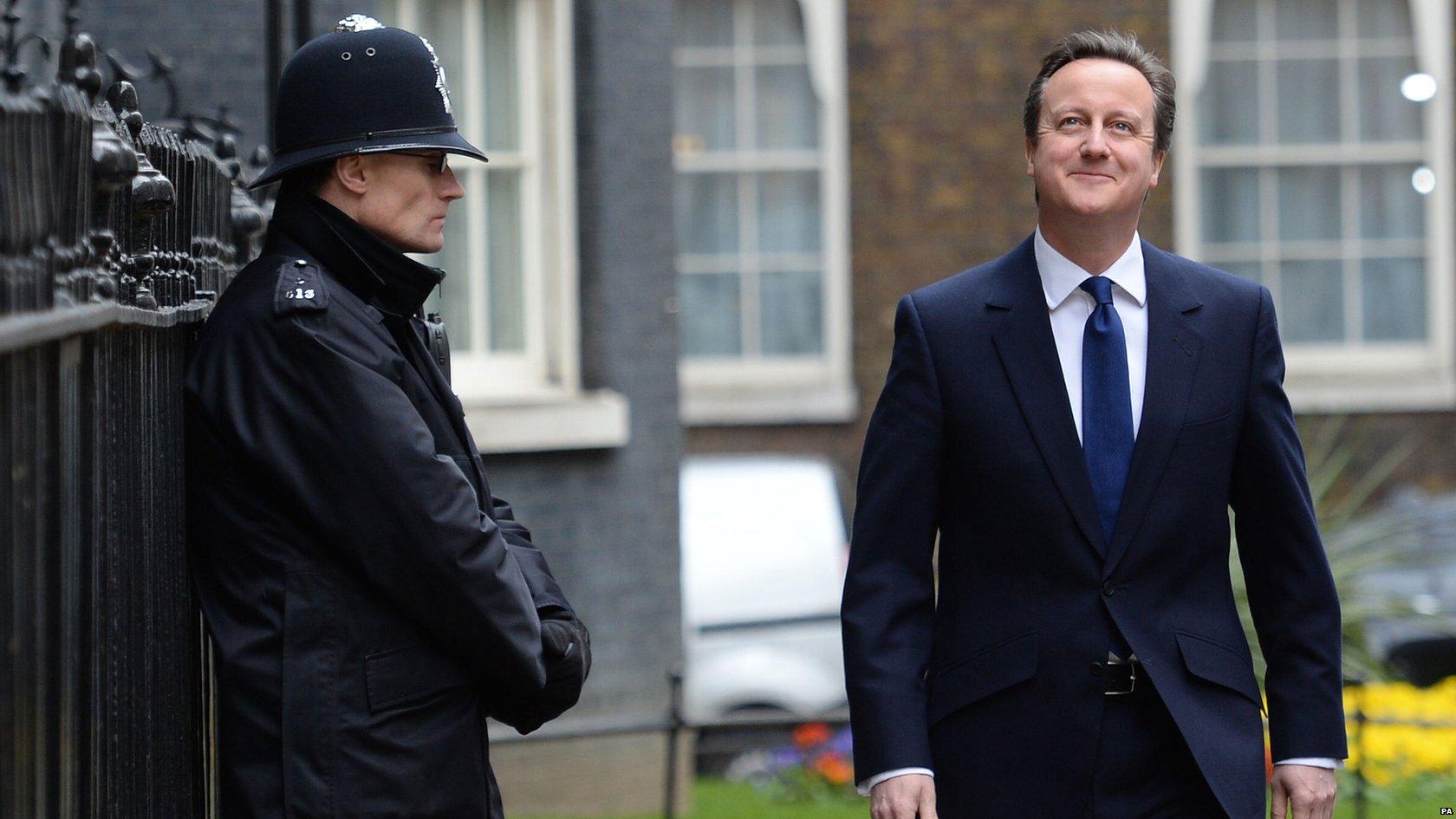
- Published30 March 2015
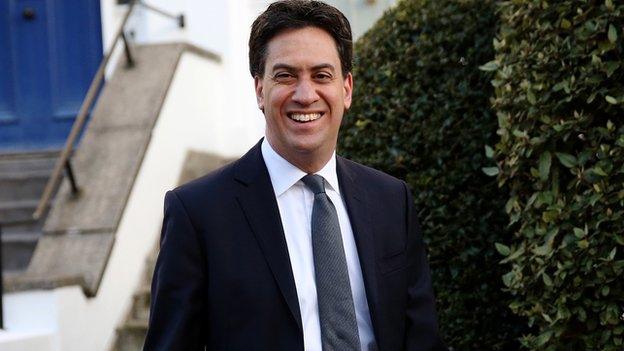
- Published30 March 2015